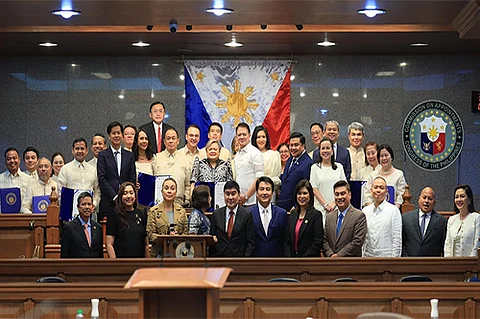
- NEWS
- the EDIT
- COMMENTARY
- BUSINESS
- LIFE
- SHOW
- ACTION
- GLOBAL GOALS
- SNAPS
- DYARYO TIRADA
- MORE

The Senate impeachment court clarified on Wednesday that it retains jurisdiction over the impeachment case against Vice President Sara Duterte — even after the articles of impeachment were returned to the House of Representatives.
“Please just read the order. It clearly states, ‘returned without dismissing or terminating the case,’” said Senate President and impeachment court presiding officer Francis “Chiz” Escudero in a press conference.
The clarification came in response to the argument of Duterte’s legal team that she could no longer be compelled to respond to the charges since the articles had been sent back to the House.
In her Answer Ad Cautelam — Latin for “with caution” — Duterte asserted that “there are no Articles of Impeachment presently with this Court.”
Escudero reiterated that while the Senate still has jurisdiction, the proceedings cannot resume until the 20th Congress convenes, as the authority of the House prosecutors will end with the 19th Congress on 30 June.
“We said this before — the trial can’t proceed with only one side,” Escudero said, noting that prosecution spokesperson Atty. Rudy Bucoy’s designation will also lapse with the close of the current Congress.
Next steps in 20th Congress
According to Escudero, the Senate impeachment court can reconvene once the 20th Congress opens and the House reappoints its prosecutors and passes a resolution affirming its intent to pursue the case. The court may also reconvene motu proprio if a senator-judge calls for deliberations on a specific issue.
New senator-judges will be sworn in when proceedings resume.
Once reconvened, the court will first determine whether the House’s submissions meet constitutional requirements — particularly the rule barring the filing of more than one impeachment complaint against the same official within a year.
The court will also address Duterte’s Answer Ad Cautelam. Escudero emphasized that it is within Duterte’s legal right to file a motion to dismiss the case.
“No motions are prohibited... and decisions are made by a simple majority,” he said.
Escudero added that while the trial is expected to continue into the 20th Congress, any decisions made by the 19th Congress or the previous Senate will not be binding on the new impeachment court.
“They may reverse, amend, or abandon those earlier rulings,” he said.
